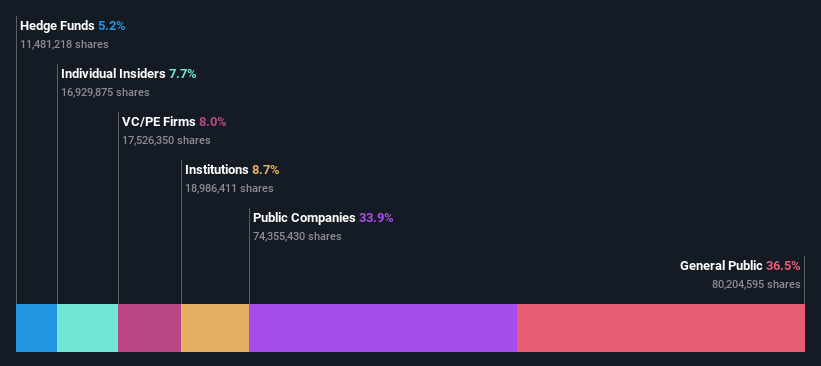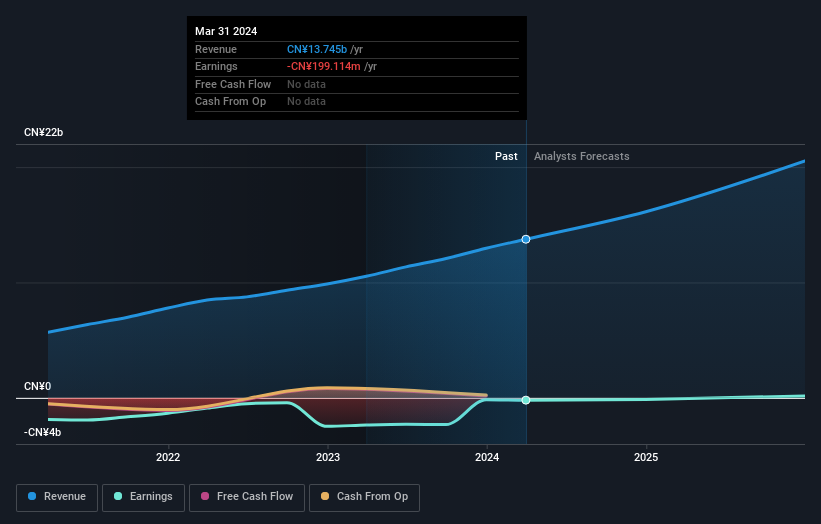- United States
- /
- Specialty Stores
- /
- NYSE:RERE
Retail investors in ATRenew Inc. (NYSE:RERE) are its biggest bettors, and their bets paid off as stock gained 9.6% last week

Key Insights
- The considerable ownership by retail investors in ATRenew indicates that they collectively have a greater say in management and business strategy
- The top 4 shareholders own 55% of the company
- Past performance of a company along with ownership data serve to give a strong idea about prospects for a business
To get a sense of who is truly in control of ATRenew Inc. (NYSE:RERE), it is important to understand the ownership structure of the business. And the group that holds the biggest piece of the pie are retail investors with 37% ownership. That is, the group stands to benefit the most if the stock rises (or lose the most if there is a downturn).
Clearly, retail investors benefitted the most after the company's market cap rose by US$53m last week.
In the chart below, we zoom in on the different ownership groups of ATRenew.
Check out our latest analysis for ATRenew

What Does The Institutional Ownership Tell Us About ATRenew?
Institutions typically measure themselves against a benchmark when reporting to their own investors, so they often become more enthusiastic about a stock once it's included in a major index. We would expect most companies to have some institutions on the register, especially if they are growing.
ATRenew already has institutions on the share registry. Indeed, they own a respectable stake in the company. This can indicate that the company has a certain degree of credibility in the investment community. However, it is best to be wary of relying on the supposed validation that comes with institutional investors. They too, get it wrong sometimes. It is not uncommon to see a big share price drop if two large institutional investors try to sell out of a stock at the same time. So it is worth checking the past earnings trajectory of ATRenew, (below). Of course, keep in mind that there are other factors to consider, too.

Our data indicates that hedge funds own 5.2% of ATRenew. That's interesting, because hedge funds can be quite active and activist. Many look for medium term catalysts that will drive the share price higher. JD.com, Inc. is currently the company's largest shareholder with 34% of shares outstanding. 5Y Capital is the second largest shareholder owning 8.0% of common stock, and Xuefeng Chen holds about 7.7% of the company stock. Xuefeng Chen, who is the third-largest shareholder, also happens to hold the title of Chairman of the Board.
On looking further, we found that 55% of the shares are owned by the top 4 shareholders. In other words, these shareholders have a meaningful say in the decisions of the company.
Researching institutional ownership is a good way to gauge and filter a stock's expected performance. The same can be achieved by studying analyst sentiments. There is some analyst coverage of the stock, but it could still become more well known, with time.
Insider Ownership Of ATRenew
The definition of company insiders can be subjective and does vary between jurisdictions. Our data reflects individual insiders, capturing board members at the very least. The company management answer to the board and the latter should represent the interests of shareholders. Notably, sometimes top-level managers are on the board themselves.
Insider ownership is positive when it signals leadership are thinking like the true owners of the company. However, high insider ownership can also give immense power to a small group within the company. This can be negative in some circumstances.
Our most recent data indicates that insiders own some shares in ATRenew Inc.. In their own names, insiders own US$44m worth of stock in the US$571m company. This shows at least some alignment. You can click here to see if those insiders have been buying or selling.
General Public Ownership
The general public-- including retail investors -- own 37% stake in the company, and hence can't easily be ignored. While this size of ownership may not be enough to sway a policy decision in their favour, they can still make a collective impact on company policies.
Private Equity Ownership
With a stake of 8.0%, private equity firms could influence the ATRenew board. Sometimes we see private equity stick around for the long term, but generally speaking they have a shorter investment horizon and -- as the name suggests -- don't invest in public companies much. After some time they may look to sell and redeploy capital elsewhere.
Public Company Ownership
It appears to us that public companies own 34% of ATRenew. This may be a strategic interest and the two companies may have related business interests. It could be that they have de-merged. This holding is probably worth investigating further.
Next Steps:
While it is well worth considering the different groups that own a company, there are other factors that are even more important. Case in point: We've spotted 2 warning signs for ATRenew you should be aware of.
Ultimately the future is most important. You can access this free report on analyst forecasts for the company.
NB: Figures in this article are calculated using data from the last twelve months, which refer to the 12-month period ending on the last date of the month the financial statement is dated. This may not be consistent with full year annual report figures.
New: Manage All Your Stock Portfolios in One Place
We've created the ultimate portfolio companion for stock investors, and it's free.
• Connect an unlimited number of Portfolios and see your total in one currency
• Be alerted to new Warning Signs or Risks via email or mobile
• Track the Fair Value of your stocks
Have feedback on this article? Concerned about the content? Get in touch with us directly. Alternatively, email editorial-team (at) simplywallst.com.
This article by Simply Wall St is general in nature. We provide commentary based on historical data and analyst forecasts only using an unbiased methodology and our articles are not intended to be financial advice. It does not constitute a recommendation to buy or sell any stock, and does not take account of your objectives, or your financial situation. We aim to bring you long-term focused analysis driven by fundamental data. Note that our analysis may not factor in the latest price-sensitive company announcements or qualitative material. Simply Wall St has no position in any stocks mentioned.
About NYSE:RERE
ATRenew
Through its subsidiaries, operates pre-owned consumer electronics transactions and services platform in the People’s Republic of China.
High growth potential with adequate balance sheet.

